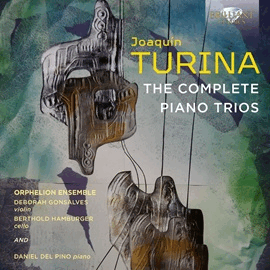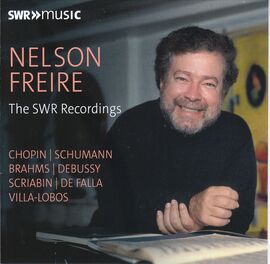Erhebliche Tonschwankungen lassen das Hören des Andante spianato & Grande Polonaise brillante zur Qual werden. Das ist kein guter Einstieg in die SWR-Aufnahmen von Nelson Freire. Glücklicherweise ist die zwei Jahre zuvor entstandene Aufnahme der 2. Sonate klanglich besser und entführt uns in eine fulminante Interpretation voller Kontraste zwischen Lyrismus und drängendem Furioso, die typisch war für den 24 Jahre alten Brasilianer. Das vierte Scherzo, dreißig Jahre später aufgenommen, ist viel poetischer.
Das zweite Programm wurde 1999 in Mainz aufgenommen und zeigt uns Freire zunächst als tiefschürfenden Schumann-Interpreten mit der Fantasie, op. 17 und der Arabesque, op. 18, die beide sehr bewegend werden. Auch die Brahms-Rhapsodien zeigen Freire in Topform. Er spielt einerseits sehr poetisch, andererseits mit jener rhythmischen Individualität, die sein Spiel stets kennzeichnete. Die Estampes von Debussy beschließen das Programm sehr atmosphärisch.
Das dritte Album beginnt mit einer spannungsvollen Aufnahme von Alexander Scriabins Prométhée, das Freire nie im Studio aufgenommen hat, wenn meine Informationen stimmen. Bei Scriabin ist der Mythos weniger auf das schöpferische Element des Prometheus konzentriert als vielmehr auf den Raub des Feuers, was dem Komponisten lichterfüllte Bilder ermöglicht. Die Tondichtung hat viele sehr divergierende Annäherungsversuche erfahren. Mit Dennis Russell Davies und Freire haben wir es mit einer Interpretation zu tun, die mit viel Misterioso und Flatterhaftigkeit die Musik sehr leicht werden lässt, ohne das Spektakuläre zu vernachlässigen.
Manuel de Fallas ‘Nächte in spanischen Gärten’, 1970 aufgenommen, bleiben etwas prosaisch, was vor allem am Dirigenten Ernest Bour liegen mag. Diese Aufnahme auszugraben, war überflüssig.
Die Fantasie für Klavier & Orchester Momoprecoce seines Landsmanns Heitor Villa-Lobos hat Nelson Freire oft gespielt. Villa-Lobos gab Momoprecoce den Titel Fantasia, und es ist ein durchkomponiertes Arrangement von Melodien aus der Klaviersuite Carnaval das Crianças aus dem Jahr 1920, das in sich folgenden Szenen die Welt des Karnevals aus der Sicht von Kindern beschwört.
Freires Interpretation des Werks ist unvergleichlich. Seine Virtuosität bringt in Verbindung mit seinem poetischen Gespür viel Transparenz in die farbenfrohen Szenen des Stücks. Guschlbauer versteht es meisterhaft, das Orchester durch viele rhythmische Wechsel zu führen und die passenden Farben und Stimmungen zu finden.
Considerable fluctuations make listening to the Andante spianato & Grande Polonaise brillante a torture. This is not a good introduction to the SWR recordings by Nelson Freire. Fortunately, the following recording of the 2nd Sonata, made two years earlier, is better in sound and takes us into a brilliant interpretation full of contrasts between lyricism and urgent furioso, which was typical of the then 24-year-old Brazilian. The fourth Scherzo, recorded thirty years later, is much more poetic.
The second program was recorded in Mainz in 1999 and initially shows Freire as an excellent Schumann interpreter with the Fantasy, op. 17 and the Arabesque, op. 18, both of which are very moving. The Brahms Rhapsodies also show Freire in top form. On the one hand he plays very poetically, on the other with the rhythmic individuality that has always characterized his playing. The Estampes by Debussy bring the program to a very atmospheric close.
The third album begins with an exciting recording of Alexander Scriabin’s Prométhée, which Freire never recorded in the studio, if my information is correct. In Scriabin’s work, the myth focuses less on the creative element of Prometheus and more on the theft of fire, which allows the composer to create light-filled images. The tone poem has experienced many very divergent approaches. With Dennis Russell Davies and Freire, we are dealing with an interpretation that makes the music very light with a lot of misterioso and flutteriness, without neglecting the spectacular.
Manuel de Falla’s ‘Nights in Spanish Gardens’, recorded in 1970, remains somewhat prosaic, which may be mainly due to the conductor Ernest Bour. Digging up this recording was superfluous.
Nelson Freire often played the Fantasy for Piano & Orchestra Momoprecoce by his compatriot Heitor Villa-Lobos. Villa-Lobos gave Momoprecoce the title Fantasia, and it is a through-composed arrangement of melodies from the piano suite Carnaval das Crianças from 1920, which conjures up the world of carnival from the perspective of children in successive scenes.
Freire’s interpretation of the work is incomparable. His virtuosity, combined with his poetic flair, brings a great deal of transparency to the colorful scenes of the piece. Guschlbauer is a master at guiding the orchestra through many rhythmic changes and finding the right colors and moods.


















